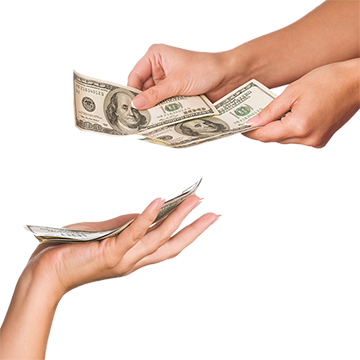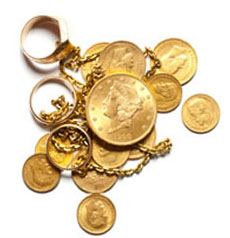Pawnshop 101: What you need to know
If you've found yourself needing some quick cash recently, you may have considered heading to a pawnshop. You're not alone. The bad economy has prompted many people to visit a pawnshop for the first time.
 "We're seeing more people who have never been in a pawnshop before looking for short-term solutions without having to sell the farm," says Rick Harrison, whose family owns the Gold and Silver Pawnshop in Las Vegas and stars in The History Channel series, "Pawn Stars."
"We're seeing more people who have never been in a pawnshop before looking for short-term solutions without having to sell the farm," says Rick Harrison, whose family owns the Gold and Silver Pawnshop in Las Vegas and stars in The History Channel series, "Pawn Stars."
You shouldn't feel afraid or embarrassed about heading to a pawnshop, but there are some things you need to know.
Don't believe the bad image
Pawnshops aren't the shady, scary places they often appear to be in the media. "Pawnshops have been unjustly vilified by the main stream media, and so most people perceive pawnshops to be dirty and seedy," says Harrison.
Instead, pawnshops are regulated by 12 federal laws plus numerous state and local laws," says Emmett Murphy, spokesman for the National Pawnbrokers Association, or NPA. "The majority are clean, well-lit stores run by people who pride themselves on providing good customer service." Murphy advises checking with the local Better Business Bureau, or looking on the NPA's Web site for member stores in your area.
Getting the loan
Here's how a pawnshop transaction works:
- Pawnshops offer collateral-based loans -- meaning the loan is secured by something of value. You bring in something you own, and if the pawnbroker is interested, he will offer you a loan. The pawnbroker then keeps your item until you repay the loan. The loan amount will likely be a small fraction of the item's actual value.
- You can sell your item to the pawnshop outright, but pawnbrokers are less enthusiastic about these transactions because loans offer much more profit potential for the pawnbroker.
- You must receive a pawn ticket. Don't lose this! Not only is it the receipt for your item, but it also summarizes the terms of your loan: fees, expiration date, description of your item, etc.
Repaying the loan
You have two choices on repayment:
- Return to pay the balance -- including the loan amount plus all added fees -- before the deadline, which is usually one to four months after the initial transaction.
- Don't return and the pawnshop keeps your item. Aside from losing your item, there are no other consequences: no collection action and no affect on your credit report. On average, though, 80 percent of all customers do reclaim their items, according to the National Pawnbrokers Association.
In some locations, you can extend the loan period by up to several months, but you'll incur additional charges.
The interest rate explained (... sort of)
The dollars and cents of pawnshop loans get a little complicated because: a) rules regarding the fees vary widely from state to state, and b) it's not a cut-and-dried interest rate.
The term "interest rate" can be very confusing, so it's better to think of total allowable "finance charge," says Steve Krupnik of South Bend, Ind., creator of the Pawn Shop Advisor coaching program and author of the book "Pawnonomics."
"Pawnshop loans are nearly all state-regulated, and 'finance charges' can vary from 5 percent per month to 25 percent per month. In Indiana, the 'interest rate' is capped at 36 percent APR or 3 percent per month, but pawnshops can charge an additional 20 percent per month service charge, making the total allowable finance charge 23 percent per month," says Krupnik.
In New York, the maximum interest rate is 4 percent per month, and a service charge of up to $10. The interest rates may seem steep, but Murphy says these aren't meant to be a substitute for bank loans.
"These are what we call 'safety net loans' and are usually for life emergencies." The typical fee, he adds, is often lower than the cost of a bounced check or a disconnected utility.
To learn the maximum rates allowed in your area -- along with any rules regarding pawnshop transactions -- check your state's Web site; most likely, the information will be in the consumer protection section.
The bottom line: Make sure the pawnbroker clearly explains all the fees involved in your loan before you finalize the transaction. These terms also should be listed on your pawn ticket.
What pawnshops do -- and don't -- want
When considering pawning something, keep these tips in mind:
Don't: Offer anything outdated, difficult to store or cheaply made, Krupnik advises.
Do: Go with jewelry or coins, Harrison suggests. Other good choices, according to Krupnik, are firearms, high-quality tools and musical instruments.
Be prepared for red tape
The pawnbroker is legally obligated to confirm that you are the legal owner of the property.
"They will ask you enough questions about your property to become comfortable with the fact that you own it," says Krupnik. "Do not be offended; the pawnbroker is just trying to make sure that both you and the property are legitimate. Also, if you do business with the pawnbroker, expect to have to show a government-issued ID. It is required by law."
Article provided by http://www.bankrate.com/ and can be viewed at http://www.bankrate.com/finance/personal-finance/pawnshop-101-what-you-need-to-know-1.aspx
